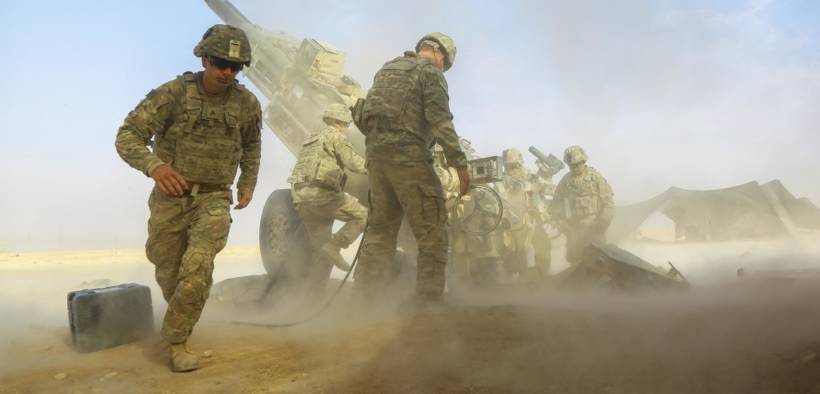US Strikes Alleged Iran-Backed Proxies in Iraq Following Death of US Contractor

“We will not stand for the Islamic Republic of Iran to take actions that put American men and women in jeopardy.”
At least 25 militants were reportedly killed on Sunday and about 55 others wounded after US forces carried out airstrikes against the Kataib Hezbollah militant group, an allegedly Iran-backed group based in Iraq, according to reports from Iraqi security and the militant group’s sources. The US airstrikes came just days after an American contractor was killed in a strike on an Iraqi base.
The sources added that among those killed were four senior leaders of the group. The four were killed after one of the airstrikes struck the Kataib Hezbollah’s headquarters near the Al-Qaim province, along the Iraqi-Syrian borders. Of the five areas targeted three were in Iraq and two in Syria, and included weapons facilities as well as command locations.
The Pentagon confirmed on Sunday that the US had carried out the airstrikes. “The airstrikes were in response to repeated attacks by the Kataib Hezbollah on Iraqi basis that host Operation Inherent Resolve (OIR), coalition forces. The strikes were defensive ones and targeted five KH facilities in Iraq and Syria. They will undermine KH’s ability to carry out further future attacks against the OIR,” said the chief spokesman for the Pentagon, Jonathan Hoffman, in a statement.
Reaction to US Airstrikes
Describing the strikes as successful, US Secretary of State Mike Pompeo told reporters at President Donald Trump’s Mar-a-Lago club in Palm Beach, Florida, where Trump was briefed on the strikes, “We will not stand for the Islamic Republic of Iran to take actions that put American men and women in jeopardy.”
In addition, Secretary of Defense Mark Esper described the attacks as successful, hinting at the possibility that the US could take further similar “additional actions.”
Reacting to the US airstrikes in Iraqi territories, the Iraqi government of outgoing Prime Minister Abel Abdel Mahdi issued a statement describing the strikes as a “violation of Iraqi sovereignty.”
An Iraqi security official told AFP that only a few hours after the US raids on five different locations, four rockets exploded near a base housing US troops close to the Iraqi capital of Baghdad.
Death of American Contractor
Last Friday, a U.S. civilian contractor was killed and several other American and Iraqi servicemen were wounded when a missile hit an Iraqi military base in the Iraqi oil-rich city of Kirkuk. According to Al Jazeera, U.S. interests in Iraq have been hit by a “flurry of rocket attacks” since October which have not been claimed but the U.S. blames on Iran-backed Shia paramilitary groups.
A spokesperson for the Iraqi Defense Ministry, Yehia Rasool, was quoted as saying at the time, “The gangs of the Islamic State terrorist group, known as Isis, could be behind the rocket attack. It is likely that such a group might re-emerge active in the region, as Iraqi security forces are busy, protecting the protesters.”
Iraq has been witnessing large-scale popular protests since early October. Protesters accuse the Iraqi government of being corrupt and beholden to foreign interests while Iraqi civilians suffer through a lack of jobs, healthcare and education.
The protests have been met with lethal force by Iraqi security forces and have resulted in the killing of five hundred Iraqis and the injury of many thousands of others. The Iraqi government, dominated by Shiite elements, had earlier warned against further protests by Iraqis, the majority of whom are Sunni Muslims.
Amidst the tension across the country, both Iraqi President Barham Salih and Iraqi Prime Minister Adel Abdul-Mahdi agreed to resign from their positions in order to meet protesters’ demands. However, replacements have not yet been chosen.
Tension Between Washington and Tehran
Over the past several years, the U.S. and Iran have traded accusations of destabilizing the Gulf region. Most recently, in the fall of 2019, several rockets hit targets near American facilities housing US government employees and service members in Iraq which the U.S. has blamed on Iran proxies.
Secretary of State Mike Pompeo earlier this month accused “Iranian proxies” of two attacks on Iraqi military bases near Baghdad airport which wounded five Iraqi soldiers, two of them critically. He promised Iranian leaders a “decisive U.S. response,” if they or their proxies harm Americans or American allies or interests in the region.
There are currently 5,000 U.S. soldiers across Iraq.















